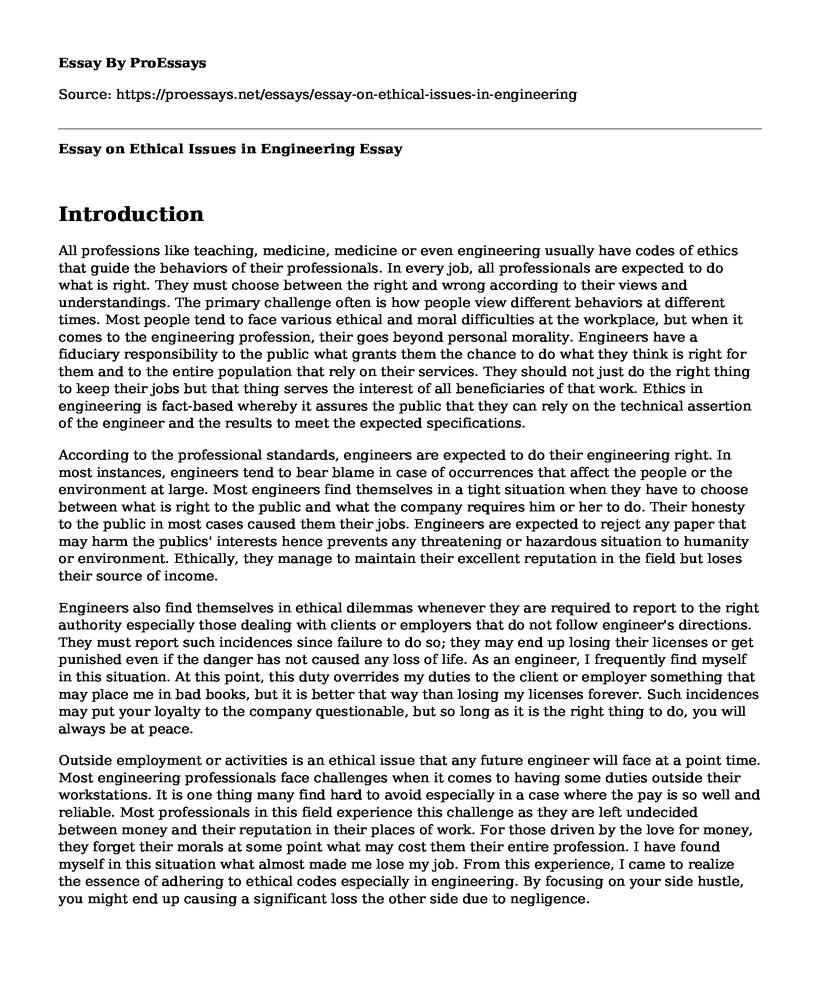Introduction
All professions like teaching, medicine, medicine or even engineering usually have codes of ethics that guide the behaviors of their professionals. In every job, all professionals are expected to do what is right. They must choose between the right and wrong according to their views and understandings. The primary challenge often is how people view different behaviors at different times. Most people tend to face various ethical and moral difficulties at the workplace, but when it comes to the engineering profession, their goes beyond personal morality. Engineers have a fiduciary responsibility to the public what grants them the chance to do what they think is right for them and to the entire population that rely on their services. They should not just do the right thing to keep their jobs but that thing serves the interest of all beneficiaries of that work. Ethics in engineering is fact-based whereby it assures the public that they can rely on the technical assertion of the engineer and the results to meet the expected specifications.
According to the professional standards, engineers are expected to do their engineering right. In most instances, engineers tend to bear blame in case of occurrences that affect the people or the environment at large. Most engineers find themselves in a tight situation when they have to choose between what is right to the public and what the company requires him or her to do. Their honesty to the public in most cases caused them their jobs. Engineers are expected to reject any paper that may harm the publics' interests hence prevents any threatening or hazardous situation to humanity or environment. Ethically, they manage to maintain their excellent reputation in the field but loses their source of income.
Engineers also find themselves in ethical dilemmas whenever they are required to report to the right authority especially those dealing with clients or employers that do not follow engineer's directions. They must report such incidences since failure to do so; they may end up losing their licenses or get punished even if the danger has not caused any loss of life. As an engineer, I frequently find myself in this situation. At this point, this duty overrides my duties to the client or employer something that may place me in bad books, but it is better that way than losing my licenses forever. Such incidences may put your loyalty to the company questionable, but so long as it is the right thing to do, you will always be at peace.
Outside employment or activities is an ethical issue that any future engineer will face at a point time. Most engineering professionals face challenges when it comes to having some duties outside their workstations. It is one thing many find hard to avoid especially in a case where the pay is so well and reliable. Most professionals in this field experience this challenge as they are left undecided between money and their reputation in their places of work. For those driven by the love for money, they forget their morals at some point what may cost them their entire profession. I have found myself in this situation what almost made me lose my job. From this experience, I came to realize the essence of adhering to ethical codes especially in engineering. By focusing on your side hustle, you might end up causing a significant loss the other side due to negligence.
Cite this page
Essay on Ethical Issues in Engineering. (2022, Apr 04). Retrieved from https://proessays.net/essays/essay-on-ethical-issues-in-engineering
If you are the original author of this essay and no longer wish to have it published on the ProEssays website, please click below to request its removal:
- Report Example on Counterfeit Machinery Components
- Essay Example on the Texas City Oil Refinery Explosion
- The Future of Design Teams and BIM Essay
- Toyota Lean Techniques Essay
- Paper Example on Exxon Valdez Oil Spill
- The Engineering and Construction Career Path: Where to Begin?
- Essay Example on Gliding: Exploring the Fascinating World of Engineless Aircraft







